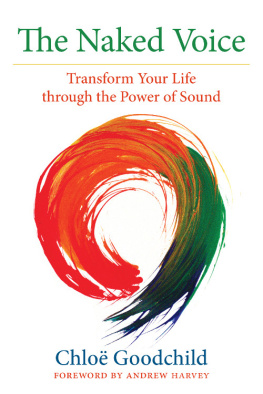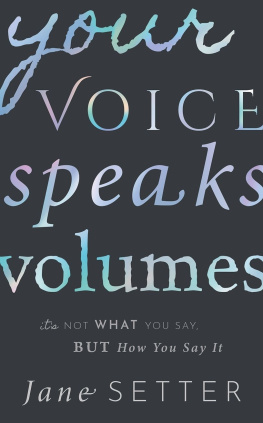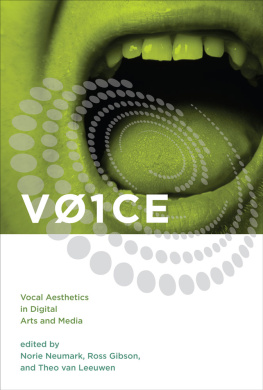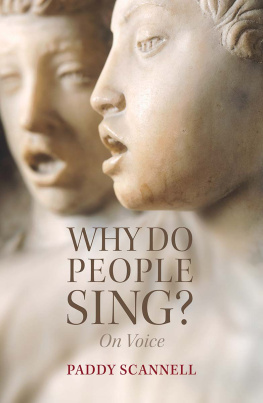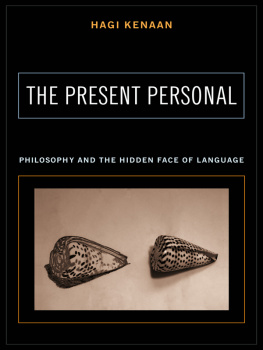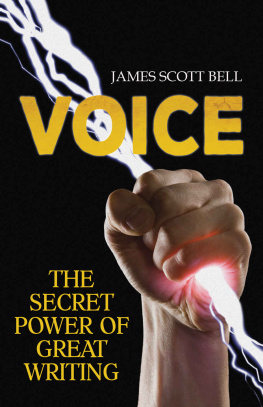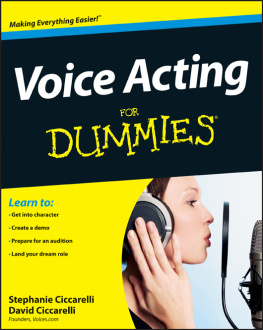For Bianca and Lola, delicious voices both
Contents
Every day, in countless different ways, we employ sublime skills of which were only faintly, fleetingly, conscious. We use them when we buy a newspaper as much as when we comfort a bereaved friend, when we ask for a rise as much as when we recite poetry. Without them, our language instincts would count for nothing: we simply wouldnt be able to understand one another. For not only are they the channel through which thoughts become speech, but also they give our words meaning, and tint them with feelings. However hesitant we might think we are, most of us, from the very moment of birth, spontaneously demonstrate the use of this most glorious instrument our human voice.
Throughout our lives we make decisions, often unwittingly, on the basis of the sound of a persons voice: lovers as well as political candidates get selected for vocal reasons. Our lilt, twang, or tremor are eloquent often beyond words. The voice can also make sentences do somersaults. I dont think so might be an innocent expression of uncertainty or an example of withering sarcasm the voice tells us which. Not bad given the right tone can glow with praise. Yet signal oddly with your voice by transgressing the normal codes of volume, pause, and pitch and you can entirely sabotage conversation, turning sense into nonsense.
Or consider this. A 63-year-old man phones his 91-year-old mother, who lives some seventy-five miles away, every two or three days. I can tell, less than a second into the call, how my mother is. I know every one of her ailments from her voice as she answers. I know that my voice has an emotionally cheering and uplifting effect on her. If shes down, at the end of the call I can hear her very picked up. It doesnt matter what Ive said I can use my voice to pick her up from her 90-something doldrums. People who have to rely on the phone to maintain close relationships tend to hone those skills. A 50-year-old American woman living in London says, I dont ring my mother if Im feeling distressed or drunk because I know that shes fantastically good at hearing whats wrong.
Then theres the 12-year-old boy, six weeks into his new school, who has worked out which of his teachers like him mainly through their tone of voice. As a result he speaks in a more friendly way to those teachers, who respond more warmly back to him, creating a loop of approval.
None of these people possesses exceptional vocal abilities: theyre simply using the acoustic capacities with which they were born. Of course there are some individuals who are aurally gifted, like the 56-year-old woman who told me, somebody can say hello to me on the phone and I know if I can trust them.
Her hunch seems less far-fetched when you learn that a recent American study found that, from just forty seconds of surgeon-patient consultations from which the words had been filtered out, leaving tone of voice alone, listeners could tell which doctors had been sued for malpractice and which hadnt. The degree of dominance or concern in the surgeons voice was a giveaway.
Despite all this, we have very little collective sense in Western societies of the importance of the voice, and almost no shared language with which to talk about it. We persist instead with the idea that the move from a primarily oral to a mainly literate society has made the voice much less important than the image and the written word, as if the voice belonged at the periphery of human experience, rather than at its centre. In all the last few decades excited debate over the role of language, speech, and conversation, the voice is often no more than an afterthought.
In reality, as I hope to show, the voice lies at the heart of what it is to be human. It plays a crucial role in helping babies establish secure emotional ties, acquire language, develop empathy and social skills. Adults milk it for information in their intimate relationships and professional lives. And now, when radio and television are so prominent and telephone and digital media inescapable, theres a renewed interest in sound thats beginning to stoke fresh fascination with the role of the voice.
In the pages that follow, I hope to convince you of the extraordinary properties of what are essentially vibrations of air. I want you to be bewitched, as you sit on a bus or in a restaurant, by the way that different parts of the body lungs, abdomen, throat, lips, teeth, tongue, palate, and jaw unite to make a voice, and how tiny changes in one of them can entirely alter mood and meaning. We can do with our voices what typographers do with print italicise, put into bold or inverted commas. Some people make their words purr, others use their voice as a bayonet. Within the space of a few minutes, we can become siren or screamer, patron or soother, just through labial flexibility and the reshaping of our internal cavities.
The voice is one of our most powerful instruments, lying at the heart of the communication process. It belongs to both the body and the mind. Its shaped by our earliest infant experience and by powerful social conventions. It bridges our internal and external worlds, travelling from our most private recesses into the public domain, revealing not only our deepest sense of who we are, but also who we wish we werent. Its a superb guide to fear and power, anxiety and subservience, to another persons vitality and authenticity as well as our own.
You cant really know a person until you have heard them speak. Most of us have hidden under the duvet, remembering how our voice unintentionally betrayed some emotion that wed thought and hoped was securely padlocked away. There can hardly be a person who hasnt bristled over a conversation with someone whose words were unexceptional but whose tone of voice delivered an entirely different message. The voice can invite or discourage intimacy, without our having to be verbally explicit, We use our voice to repel and attract, encourage or undermine. As animals with smell, so are humans with voices.
And yet were often shockingly indifferent to this instrument an indifference this book sets out to challenge.
1
What the Voice Can Tell Us
One balmy friday evening in Silicon Valley, Amy and Bruno Smart fantasised about inventing a new kind of machine. The Smartacom would reveal everything youd want to know about another persons education, status, self-confidence, and even state of sexual arousal in under a minute, even from six feet away. The excited Smarts set about creating and testing a prototype and it worked! There was just one problem. The Smartacom violated every single privacy law in existence, and had the Smarts been audacious enough to manufacture it, the Federal Trade Commission would have made sure that their business dissolved faster than the Wicked Witch of the West.
The Smarts were actually very dumb. They hadnt realised that an instrument like the one theyd invented already existed. Whats more, it breaks no laws and is free. It goes by the name of the human voice.
In an era so preoccupied with privacy and its infringement, with hackers and cookies and data protection, were remarkably breezy about the personal information that seeps from our voices. Employers award fat contracts to psychometric companies promising to uncover their staffs hidden flaws and skills, while ignoring what those same staff are freely divulging through their voices. We take this fabulously rich resource for granted, yet if the human voice were a new technology we would be hymning it loudly, and extolling its special properties.
For the moment we open our mouths and start to speak, even if its only to read out regulations for the disposal of sewage, our voice is doing something terrifyingly intimate leaking information about our biological, psychological, and social status. Through it, our size, height, weight, physique, sex, can be detected.



